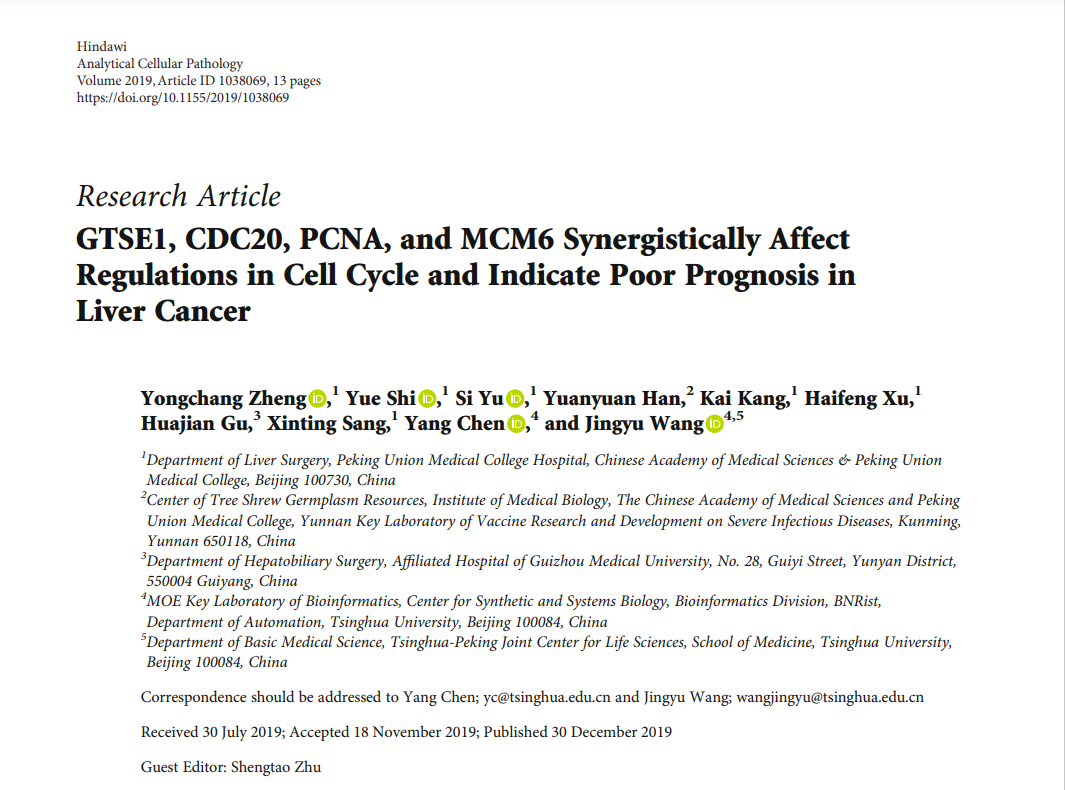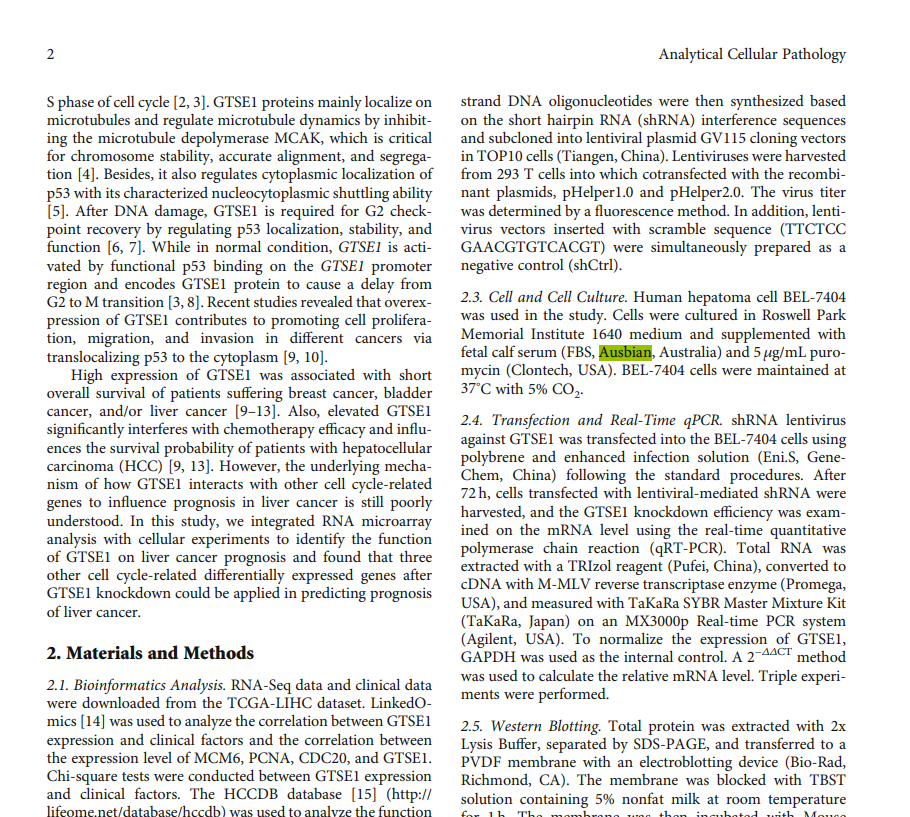GTSE1、CDC20、PCNA和MCM6協同影響肝癌細胞周期調控并提示預后不良 二維碼
發表時間:2024-08-30 14:32 2019年12月,中國醫學科學院;北京協和醫學院北京協和醫院肝臟外科;中國醫學科學院;北京協和醫學院醫學生物學研究所樹鼩種質資源研究中心;云南省重癥傳染病疫苗研究與開發重點實驗室;貴州醫科大學附屬醫院;清華大學自動化系生物信息學學部合成與系統生物學中心生物信息學教育部重點實驗室;清華大學醫學院基礎醫學部;清華-北京生命科學聯合中心 (Department of Liver Surgery, Peking Union Medical College Hospital, Chinese Academy of Medical Sciences & Peking Union Medical College, Beijing 100730, China;Center of Tree Shrew Germplasm Resources, Institute of Medical Biology, The Chinese Academy of Medical Sciences and Peking Union Medical College, Yunnan Key Laboratory of Vaccine Research and Development on Severe Infectious Diseases, Kunming,Yunnan 650118, China;Department of Hepatobiliary Surgery, Affiliated Hospital of Guizhou Medical University, No. 28, Guiyi Street, Yunyan District, 550004 Guiyang, China;MOE Key Laboratory of Bioinformatics, Center for Synthetic and Systems Biology, Bioinformatics Division, BNRist,Department of Automation, Tsinghua University, Beijing 100084, China;Department of Basic Medical Science, Tsinghua-Peking Joint Center for Life Sciences, School of Medicine, Tsinghua University,Beijing 100084, China) Yongchang Zheng老師研究團隊在《Analytical Cellular Pathology》上發表論文: “GTSE1, CDC20, PCNA, and MCM6 Synergistically Affect Regulations in Cell Cycle and Indicate Poor Prognosis in Liver Cancer” “GTSE1、CDC20、PCNA和MCM6協同影響肝癌細胞周期調控并提示預后不良” Abstract: GTSE1 is well correlated with tumor progression; however, little is known regarding its role in liver cancer prognosis. By analyzing the hepatocellular carcinoma (HCC) datasets in GEO and TCGA databases, we showed that high expression of GTSE1 was correlated with advanced pathologic stage and poor prognosis of HCC patients. To investigate underlying molecular mechanism, we generated GTSE1 knockdown HCC cell line and explored the effects of GTSE1 deficiency in cell growth. Between GTSE1 knockdown and wild-type HCC cells, we identified 979 differentially expressed genes (520 downregulated and 459 upregulated genes) in the analysis of microarray-based gene expression profiling. Functional enrichment analysis of DEGs suggested that S phase was dysregulated without GTSE1 expression, which was further verified from flow cytometry analysis. Moreover, three other DEGs: CDC20, PCNA, and MCM6, were also found contributing to GTSE1-related cell cycle arrest and to be associated with poor overall survival of HCC patients. In conclusion, GTSE1, together with CDC20, PCNA, and MCM6, may synergistically promote adverse prognosis in HCC by activating cell cycle. Genes like GTSE1, CDC20, PCNA, and MCM6 may be promising prognostic molecular biomarkers in liver cancer. 摘要: GTSE1與腫瘤進展密切相關;然而,其在肝癌預后中的作用尚不清楚。通過分析GEO和TCGA數據庫中的肝細胞癌(HCC)數據集,我們發現GTSE1的高表達與HCC患者的病理分期晚期和預后不良相關。為了研究其潛在的分子機制,我們建立了GTSE1敲低的HCC細胞株,并探討了GTSE1缺乏對細胞生長的影響。在GTSE1敲低和野生型HCC細胞之間,我們在基于微陣列的基因表達譜分析中發現了979個差異表達基因(520個下調基因和459個上調基因)。DEGs功能富集分析提示S期表達異常,無GTSE1表達,流式細胞術分析進一步證實了這一點。此外,另外三種deg: CDC20、PCNA和MCM6也被發現有助于gtse1相關的細胞周期阻滯,并與HCC患者的總生存期差相關。綜上所述,GTSE1與CDC20、PCNA、MCM6可能通過激活細胞周期協同促進HCC的不良預后。GTSE1、CDC20、PCNA和MCM6等基因可能是肝癌預后的有希望的分子生物標志物。 該論文中,人肝癌細胞BEL-7404的體外培養是使用Ausbian特級胎牛血清完成的。欲了解或購買Ausbian特級胎牛血清可以聯系北京締一生物400-166-8600.
|
|





